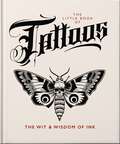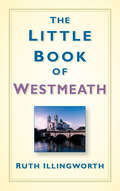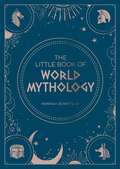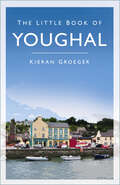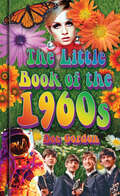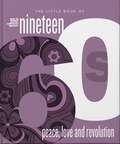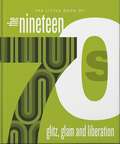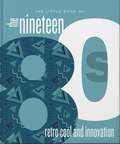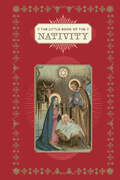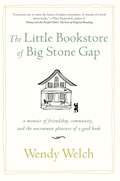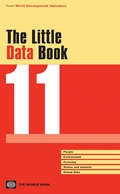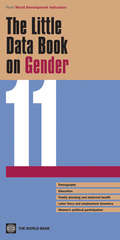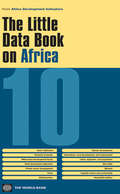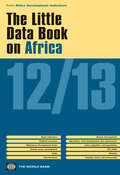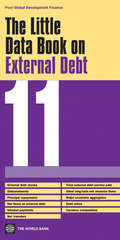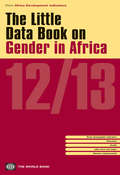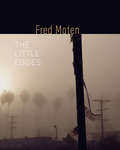- Table View
- List View
The Little Book of Tattoos (The\little Book Of... Ser.)
by Orange Hippo!Think you know ink? Think again!Whether your tattoo is to honour a loved one, to remember an event, to state your beliefs or simply to look good, there's always more to getting a tattoo than meets the eye. For example, do you know that having a tat links you to a deep and multicultural tradition stretching back thousands of years? Yes, even that one you got as a drunken dare . . .From Siberia to Polynesia, tattoos have always been part of human history. Vilified and revered, shunned and celebrated, the history of the tattoo is as colourful and detailed as a master's design. The Little Guide to Tattoos is packed with fascinating history, fun facts, quirky quotes and deep dives onto some of the most iconic symbols.Whether you're a full-on aficionado or cautiously ink-curious, The Little Guide to Tattoos is the only guide you need to all things tattoo. "Show me a man with a tattoo and I'll show you a man with an interesting past." - Jack London"Tattoos are like stories - they're symbolic of the important moments in your life." - Pamela Anderson
The Little Book of Tattoos (The\little Book Of... Ser.)
by Orange Hippo!Think you know ink? Think again!Whether your tattoo is to honour a loved one, to remember an event, to state your beliefs or simply to look good, there's always more to getting a tattoo than meets the eye. For example, do you know that having a tat links you to a deep and multicultural tradition stretching back thousands of years? Yes, even that one you got as a drunken dare . . .From Siberia to Polynesia, tattoos have always been part of human history. Vilified and revered, shunned and celebrated, the history of the tattoo is as colourful and detailed as a master's design. The Little Guide to Tattoos is packed with fascinating history, fun facts, quirky quotes and deep dives onto some of the most iconic symbols.Whether you're a full-on aficionado or cautiously ink-curious, The Little Guide to Tattoos is the only guide you need to all things tattoo. "Show me a man with a tattoo and I'll show you a man with an interesting past." - Jack London"Tattoos are like stories - they're symbolic of the important moments in your life." - Pamela Anderson
The Little Book of Westmeath
by Ruth IllingworthThe Little Book of Westmeath is a compendium of fascinating, obscure, strange and entertaining facts about County Westmeath. Here you will find out about Westmeath’s history and archaeology, its buildings and architecture, its culture and sport and its famous (and occasionally infamous) men and women. Through quaint villages and bustling towns, this book takes the reader on a journey through County Westmeatj and its vibrant past. A reliable reference book and a quirky guide, this can be dipped into time and time again to reveal something new about the people, the heritage and the secrets of this fascinating county.
The Little Book of World Mythology: A Pocket Guide to Myths and Legends
by Hannah BowsteadStep into a world of gods, heroes and monstersThroughout history, mythologies have been fundamental to societies and cultures across the world. They are the collected stories of a people - the fascinating folk tales and the epic legends that shape the history and the beliefs of whole civilizations.This pocket guide offers readers an engaging and accessible introduction to the major world mythologies, exploring their origins, foundational stories and key mythological figures.Learn how the Greeks won the ten-year Trojan war, how the Norse god Thor got his mighty hammer, and why the Aztecs made a daily human sacrifice to the sun god, Huitzilopochtli.If you're looking to enrich and expand on your understanding of world history, religion and culture, then this book is an ideal starting point to fill your mind with stories of wisdom and wonder.Discover the captivating stories behind the following mythologies: Aboriginal, Aztec, Celtic, Chinese, Egyptian, Greek, Hindu, Incan, Japanese, Maori, Mayan, Mesopotamian, Norse, Roman.
The Little Book of World Mythology: A Pocket Guide to Myths and Legends
by Hannah BowsteadStep into a world of gods, heroes and monstersThroughout history, mythologies have been fundamental to societies and cultures across the world. They are the collected stories of a people - the fascinating folk tales and the epic legends that shape the history and the beliefs of whole civilizations.This pocket guide offers readers an engaging and accessible introduction to the major world mythologies, exploring their origins, foundational stories and key mythological figures.Learn how the Greeks won the ten-year Trojan war, how the Norse god Thor got his mighty hammer, and why the Aztecs made a daily human sacrifice to the sun god, Huitzilopochtli.If you're looking to enrich and expand on your understanding of world history, religion and culture, then this book is an ideal starting point to fill your mind with stories of wisdom and wonder.Discover the captivating stories behind the following mythologies: Aboriginal, Aztec, Celtic, Chinese, Egyptian, Greek, Hindu, Incan, Japanese, Maori, Mayan, Mesopotamian, Norse, Roman.
The Little Book of Youghal
by Kieran GroegerDid you Know?St Mary’s Collegiate Church claims to be the single oldest church in Ireland to have been in constant use over the centuries. The original roof, dating to c.1200, is still in situ. It was Thomas Harriott of Youghal who first brought potatoes and tobacco back from America. He took them to London, where Walter Raleigh introduced them to Queen Elizabeth I. In 1954, part of the Hollywood film Moby Dick was filmed in Youghal. Through main thoroughfares and twisting back streets, The Little Book of Youghal takes the reader on a journey through this historic seaside resort and its vibrant past. Here you will find out about the town’s changes though the ages, its people and industries.A reliable reference and a quirky guide, this book can be dipped into time and again to reveal something new about the people, the heritage and the secrets of this historic town.
The Little Book of the 1960s (Little Book Of)
by Dee GordonBased on quirky facts and fascinating data, with a discerning eye on the bizarre, the frivolous and the funny, The Little Book of the 1960s is nostalgia with a difference. The sights, the sounds, the lifestyle, the whole 1960s experience can be relived through the pages of this book, but be warned – you’ll need a sense of humour. It’s a book that can be dipped in to time and time again to reveal something new about the people, the fashions, the scandals and the enduring fascination of a decade that was truly the most colourful of all. Did You Know? When the Beatles played at the Birkenhead YMCA in 1962 for just £30 (the same year Decca famously turned them down because ‘groups with guitars were on their way out’), they were booed off stage. When Barbara Windsor and the cast of Sparrers Can’t Sing were filming in the East End in the early 1960s, the Krays were hired to provide security on the set. When Princess Margaret married photographer Antony Armstrong-Jones in May 1960, she became the first royal to marry a commoner for 450 years.
The Little Book of the 1960s: Peace, Love and Revolution (The\little Book Of... Ser.)
by Orange Hippo!Make love, not war.At the heart of the 1960s was a desire for change, a yearning for a new way of living and a rejection of the old order. From the civil rights movement or the Vietnam War to the Apollo moon landings or the launch of the birth control pill, and from the Beatles to the Beat Generation, it was a period of revolutionary change.Packed full of fabulous facts and quotes – from civil rights leaders and counterculture icons to writers, artists and musicians – this little book captures the key events, icons and ideas that defined this tumultuous decade."A man may die, nations may rise and fall, but an idea lives on." John F. Kennedy, 1963"We must learn to live together as brothers or perish together as fools." Martin Luther King, 1964"We don't like their sound. Groups of guitars are on the way out." Decca executive, after turning down the Beatles, 1962The yellow smiley face was born in 1963 when American graphic designer Harvey Ball was approached by State Mutual Life Assurance Company to create a morale booster for employees.In 1967, South African surgeon Christiaan Barnard performed the world's first human heart transplant.In 1969, Woodstock – one of the most famous music festivals of all time – took place. More than 400,000 people attended the three days of peace and music.
The Little Book of the 1960s: Peace, Love and Revolution (The\little Book Of... Ser.)
by Orange Hippo!Make love, not war.At the heart of the 1960s was a desire for change, a yearning for a new way of living and a rejection of the old order. From the civil rights movement or the Vietnam War to the Apollo moon landings or the launch of the birth control pill, and from the Beatles to the Beat Generation, it was a period of revolutionary change.Packed full of fabulous facts and quotes – from civil rights leaders and counterculture icons to writers, artists and musicians – this little book captures the key events, icons and ideas that defined this tumultuous decade."A man may die, nations may rise and fall, but an idea lives on." John F. Kennedy, 1963"We must learn to live together as brothers or perish together as fools." Martin Luther King, 1964"We don't like their sound. Groups of guitars are on the way out." Decca executive, after turning down the Beatles, 1962The yellow smiley face was born in 1963 when American graphic designer Harvey Ball was approached by State Mutual Life Assurance Company to create a morale booster for employees.In 1967, South African surgeon Christiaan Barnard performed the world's first human heart transplant.In 1969, Woodstock – one of the most famous music festivals of all time – took place. More than 400,000 people attended the three days of peace and music.
The Little Book of the 1970s: The Era of Glitz and Glam (The\little Book Of... Ser.)
by Orange Hippo!"The era that taste forgot..."Famous for glam rock, flares and platform shoes, the 1970s also saw the emergence of new ideas, movements and trends that continue to influence our world today. From the Watergate Scandal to the growing feminist and LGBTQ+ movements, the rise of punk and disco, and the release of groundbreaking movies such as Star Wars and Jaws, it was a period marked by brave fashion and innovation, social change and cultural shifts.Packed full of fabulous facts alongside fascinating quotes from the era's movers and shakers, this little book explores the key events, ideas and style that defined this pivotal decade."I don't think there will be a woman prime minister in my lifetime." Margaret Thatcher, 1973."If a bullet should enter my brain, let that bullet destroy every closet door." Harvey Milk, a prominent LGBTQ+ rights campaigner who was assassinated in 1978.The iconic Twin Towers – standing 415 metres feet in high and at the time the tallest buildings in the world – were added to the New York skyline in 1973.The "Thrilla in Manila" – perhaps the most famous boxing match of all time in 1975 between Joe Frazier and Muhammad Ali.In April 1976, college dropouts Steve Jobs and Steve Wozniak – or "the two Steves" – formed Apple Computer, Inc.
The Little Book of the 1970s: The Era of Glitz and Glam (The\little Book Of... Ser.)
by Orange Hippo!"The era that taste forgot..."Famous for glam rock, flares and platform shoes, the 1970s also saw the emergence of new ideas, movements and trends that continue to influence our world today. From the Watergate Scandal to the growing feminist and LGBTQ+ movements, the rise of punk and disco, and the release of groundbreaking movies such as Star Wars and Jaws, it was a period marked by brave fashion and innovation, social change and cultural shifts.Packed full of fabulous facts alongside fascinating quotes from the era's movers and shakers, this little book explores the key events, ideas and style that defined this pivotal decade."I don't think there will be a woman prime minister in my lifetime." Margaret Thatcher, 1973."If a bullet should enter my brain, let that bullet destroy every closet door." Harvey Milk, a prominent LGBTQ+ rights campaigner who was assassinated in 1978.The iconic Twin Towers – standing 415 metres feet in high and at the time the tallest buildings in the world – were added to the New York skyline in 1973.The "Thrilla in Manila" – perhaps the most famous boxing match of all time in 1975 between Joe Frazier and Muhammad Ali.In April 1976, college dropouts Steve Jobs and Steve Wozniak – or "the two Steves" – formed Apple Computer, Inc.
The Little Book of the 1980s: The Decade of Retro Cool (The\little Book Of... Ser.)
by Orange Hippo!The era that inspired Stranger Things...The 1980s were marked by the rise of conservative politics, the outbreak of the AIDS epidemic and, at the decade's close, the crumbling of the Berlin Wall – an event that heralded the start of a new age in global politics. Culturally, there was an explosion of creativity while material wealth and consumerism were on the rise. Icons such as Madonna and Michael Jackson dominated the music charts, groundbreaking films like E.T. captured hearts and the rise of cable television led to an abundance of entertainment options.Packed full of fabulous facts and fascinating quotes, this little book explores the key events, icons and ideas that defined the coolest of decades."Mr Gorbachev, tear down this wall!" Ronald Reagan, 1987"I am not less life-loving than you are. But I cannot sell my birthright, nor am I prepared to sell the birthright of the people to be free." Nelson Mandela, 1985"I stand for freedom of expression, doing what you believe in and going after your dreams." MadonnaOn 8 December 1980, ex-Beatle John Lennon was shot dead.MTV, Music Television launched on 1 August 1981.In 1983, the Motorola DynaTac 8000X – affectionately known as "the Brick" – was launched. It could store 30 numbers.
The Little Book of the 1980s: The Decade of Retro Cool (The\little Book Of... Ser.)
by Orange Hippo!The era that inspired Stranger Things...The 1980s were marked by the rise of conservative politics, the outbreak of the AIDS epidemic and, at the decade's close, the crumbling of the Berlin Wall – an event that heralded the start of a new age in global politics. Culturally, there was an explosion of creativity while material wealth and consumerism were on the rise. Icons such as Madonna and Michael Jackson dominated the music charts, groundbreaking films like E.T. captured hearts and the rise of cable television led to an abundance of entertainment options.Packed full of fabulous facts and fascinating quotes, this little book explores the key events, icons and ideas that defined the coolest of decades."Mr Gorbachev, tear down this wall!" Ronald Reagan, 1987"I am not less life-loving than you are. But I cannot sell my birthright, nor am I prepared to sell the birthright of the people to be free." Nelson Mandela, 1985"I stand for freedom of expression, doing what you believe in and going after your dreams." MadonnaOn 8 December 1980, ex-Beatle John Lennon was shot dead.MTV, Music Television launched on 1 August 1981.In 1983, the Motorola DynaTac 8000X – affectionately known as "the Brick" – was launched. It could store 30 numbers.
The Little Book of the Nativity
by Dominique FoufelleExplore the history and customs connected to the nativity of Jesus in this collection featuring colorfully illustrated lithographs.The perfect companion for Christmas festivities, this little book explores the rich history surrounding the nativity. Filled with more than seventy-five entries featuring fascinating details behind the story of Jesus’s birth, the crèche, the Magi, the Immaculate Conception, and so much more, these pages illuminate the many ways the first Christmas is celebrated throughout the world. Beautifully illustrated with vibrant lithographs taken from prayer books and missals, The Little Book of the Nativity is a joyful and charming treasure for a family to gather around year after year.
The Little Book of the Octopus: An Introduction to the Mysterious and Fascinating World of One of Earth’s Most Complex Creatures
by Summersdale PublishersWith their remarkable behaviours and unique anatomy, it's hardly surprising that octopuses have captivated our imagination for centuries. But there is so much more to this misunderstood and spellbinding creature. Unravel the secrets of this astonishing animal and explore its mystifying world with The Little Book of the Octopus.
The Little Bookstore Of Big Stone Gap: A Memoir Of Friendship, Community, And The Uncommon Pleasure Of A Good Book
by Wendy WelchAn inspiring true story about losing your place, finding your purpose, and building a community one book at a time. Wendy Welch and her husband had always dreamed of owning a bookstore, so when they left their high-octane jobs for a simpler life in an Appalachian coal town, they seized an unexpected opportunity to pursue their dream. The only problems? A declining U. S. economy, a small town with no industry, and the advent of the e-book. They also had no idea how to run a bookstore. Against all odds, but with optimism, the help of their Virginian mountain community, and an abiding love for books, they succeeded in establishing more than a thriving business - they built a community. The Little Bookstore of Big Stone Gap is the little bookstore that could: how two people, two cats, two dogs, and thirty-eight thousand books helped a small town find its heart. It is a story about people and books, and how together they create community.
The Little Czech and the Great Czech Nation: National Identity and the Post-Communist Transformation of Society
by Ladislav HolyThe book intends to investigate the specific ways in which Czech cultural meanings and the accompanying nationalist sentiments have affected life under communism, its overthrow, and the political and economic transformation of post-communist society.
The Little Data Book 2011
by World BankThis pocket-sized reference on key development data for over 200 countries provides profiles of each country with 54 development indicators about people, environment, economy, technology and infrastructure, trade, and finance.
The Little Data Book On Gender 2011
by the editors at The World BankThis handy pocket guide is a quick reference for users interested in the gender statistics. The book presents gender-disaggregated data for more than 200 countries in an easy country-by-country reference on demography, education, health, labor force, political participation and the Millennium Development Goals. The book s summary pages cover regional and income group aggregates.
The Little Data Book on Africa 2010
by World Bank'The Little Data Book on Africa 2010' is a pocket edition of 'Africa Development Indicators 2010'. It contains some 115 key indicators on economics, human development, governance, and partnership and is intended as a quick reference for users of the 'Africa Development Indicators 2010' book and African Development Indicators Online. The country tables present the latest available data for World Bank member countries in Africa.
The Little Data Book on Africa 2012/2013
by World BankThe Little Data Book on Africa 2012/2013 is a pocket edition of Africa Development Indicators 2012/2013. It contains some 115 key indicators on economics, human development, governance, and partnership and is intended as a quick reference for users of the Africa Development Indicators 2010 book and African Development Indicators Online. The country tables present the latest available data for World Bank member countries in Sub-Saharan Africa, covering about 1,700 indicators from 1961 to 2011. Key themes are : - Basic indicators- Drivers of growth- Participating in growth- Capable states- PartnershipsDesigned to provide all those interested in Africa with quick reference and a reliable set of data to monitor development programs and aid flows in the region, this is an invaluable pocket edition reference tool for analysts and policy makers who want a better understanding of the economic and social developments occurring in Africa. For free access to Africa Development Indicators online, please visit http://data. worldbank. org/data-catalog.
The Little Data Book on External Debt 2011
by the editors at The World Bank'The Little Data Book on External Debt' provides a quick reference for users interested in external debt stocks and flows, major economic aggregates, key debt ratios, and the currency composition of long-term debt for all countries reporting through the Debtor Reporting system. A pocket edition of 'Global Development Finance 2011, Summary and Country Tables', it contains statistical tables for 135 countries as well as summary tables for regional and income groups.
The Little Data Book on Gender in Africa 2012/13
by World BankThe Little Data Book on Gender in Africa 2012/13 provides a summary collection of gender statistics on Africa available in one volume. It contains 60 indicators, covering 53 African countries. Additional data may be found on the companion CD-ROM or online, covering about 1,700 indicators from 1961 to 2011. Key themes are : - Basic demographic indicators- Education- Health- Labor force and wages- Women's empowermentDesigned to provide all those interested in Africa with quick reference and a reliable set of data to monitor development programs and aid flows in the region, this is an invaluable pocket edition reference tool for analysts and policy makers who want a better understanding of the economic and social developments occurring in Africa. For free access to Africa Development Indicators online, please visit http://data. worldbank. org/data-catalog.
The Little Database: A Poetics of Media Formats (Electronic Mediations #64)
by Daniel Scott SnelsonA poetics for reading the everyday objects that populate a hard drive Bespoke online archives like PennSound and Eclipse host an astounding array of &“old media&” artifacts, posing a handcrafted counterpoint to the immense databases aggregated by digital titans like Google and Facebook. In The Little Database, Daniel Scott Snelson argues for the significance of these comparatively &“small&” collections, exploring how digital archives dramatically transform the artifacts they host and how they might help us better understand our own private collections in turn. Examining curated collections such as Textz, UbuWeb, and the Electronic Poetry Center, Snelson explores media-specific works by poets and artists, including William Carlos Williams, Tracie Morris, bill bissett, Nam June Paik, and Vicki Bennett. He develops creative tools and contingent methods for reading cultural data, whether found on the internet or in our own collections of TXT, JPG, MP3, and MOV artifacts, presenting case studies to show how these objects have come to find revised meaning in their digital contexts. Along the way, experimental poetic interludes give readers practical entry points into the creative practice of producing new meanings in any given little database. Inventive and interdisciplinary, The Little Database grapples with the digitized afterlives of cultural objects, showing how the past is continually reconfigured to shape the present. It invites readers to find playful and personal means for unpacking their own data collections, in the process discovering idiosyncratic ways to explore and connect with digital archives. Retail e-book files for this title are screen-reader friendly with images accompanied by short alt text and/or extended descriptions.
The Little Edges (Wesleyan Poetry Series)
by Fred MotenThe Little Edges is a collection of poems that extends poet Fred Moten's experiments in what he calls "shaped prose"--a way of arranging prose in rhythmic blocks, or sometimes shards, in the interest of audio-visual patterning. Shaped prose is a form that works the "little edges" of lyric and discourse, and radiates out into the space between them. As occasional pieces, many of the poems in the book are the result of a request or commission to comment upon a work of art, or to memorialize a particular moment or person. In Moten's poems, the matter and energy of a singular event or person are transformed by their entrance into the social space that they, in turn, transform. An online reader's companion is available at http://fredmoten.site.wesleyan.edu.
